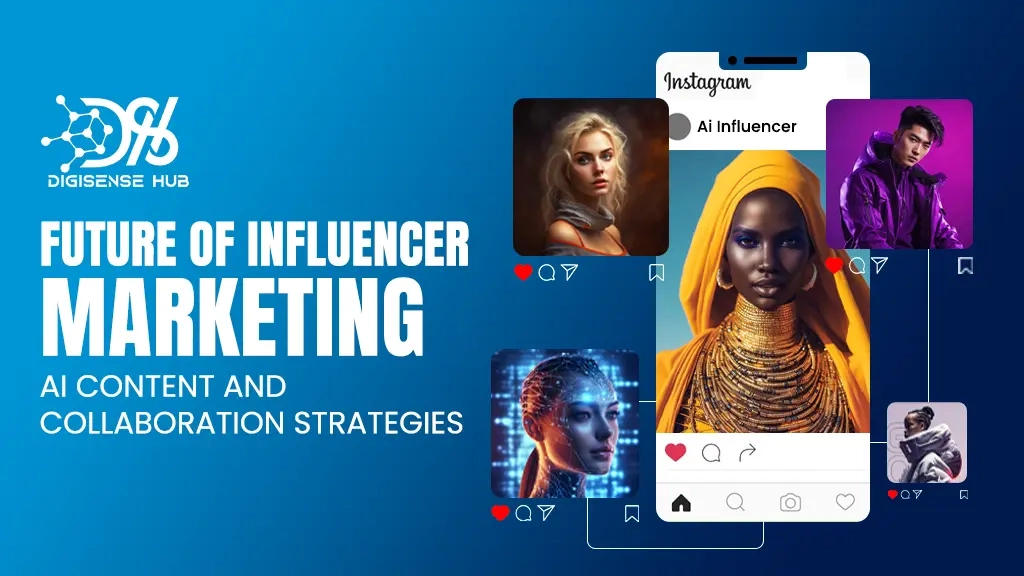Introduction to Influencer Marketing
Marketing with influencers is one of the trends that has become popular in the context of digital advertising using influences or other people with a large audience. The industry has expanded greatly with total revenue expected to exceed $15 billion (about $46 per person in the US) by 2022. Nonetheless, it is crucial to keep up with the trends and think about what influence marketing can have at some point.
The Rise of AI-Generated Content
Influencer marketing is among the industries boosted through artificial intelligence. Nowadays, AI content creation is quite popular allowing influencers to produce content at a large scale. These improvements from this new technology can help elevate the industry into a new plane of efficiency, productivity and addressed individual needs.
AI-Generated Content is Changing the Game
There’s no doubt that the use of AI in creating content is giving a new form to influencer economy. By leveraging micro content machinery, influencers can spend their time on engagement and other strategic parts of their business that creation is not as efficient for. The focused marketing approach would be more effective in the brands’ influencer marketing campaigns as they can target customers with more tailored content.
Benefits of AI-Generated Content for Influencers
There are several advantages of using AI for an influencers content creation, these are efficiency, consistency, and better engagement. In turn, this ability allows influencers to attend to other compartments of their business such as engagement and planning. This also helps the influencers to keep on maintaining the defined and unique style and feel so that the overall brand is not sometime compromised.
Benefits of AI-Generated Content for Brands
They also can also harness the power of the AI in the generation of contents such as; better contents suited to the brand, enhanced efficiency and above all better ROI. Since brands get to generate high quality contents, they can get to their target audiences with higher frequency thus enhancing the overall return on investment of the influencer’s marketing strategies.
Collaboration Strategies for Influencers and Brands
As the trends in influencer marketing develop, the tactics of collaboration will remain one of the key influencers of the evolution of the influencer industry. Both influencers and brands should devise the right message and collaborate effectively in a bid to increase sales. This is the long-term strategic partnerships, co-creation, influencer-lead strategy.
Long-Term Partnerships
Influencer marketing requires strategic partnerships that must occur for the long term for the campaign to be effective. What is more, achieving enhanced specifications of the products that both parties aim to deliver, long-term cooperation of influencers and brands can lead to the constant increase in the effectiveness of the shared interaction.
Co-Creation
Co-creation is another notable approach that content creators and brands should necessarily Employ. In a more combined paradigm, influencers and brands can not only align in the co-creation of contents, products, or services but enhance the efficacy of business outcomes.
Influencer-Led Campaigns
Branded content campaigns are shifting more and more to influencers where brands trust influencers to lead the campaigns and content production. This makes it possible for the influencers to take full control and ownership of the campaign, making the content to be more natural and appealing.
The Role of AI in Influencer Collaboration
It is also instrumental in the following ways about influencer and brand collaboration; Influencer Search, Content review, and Campaign enhancement. Firstly, EN will be a great advantage for brands as, with the help of AI, the most appropriate influencers for their campaigns will be selected.
Influencer Identification
Through artificial intelligence, brands can determine the right influencer they would want to work with in a particular campaign due to their demographic information, audience engagement rate and quality of content they produce. This technology can process big data and offers brands an inventory of influencers that share their goals.
Content Analysis
AI can also scan influencer content to gain information on performance, engagement, and even the audience’s feeling. Thus, with this technology, brands can determine the strong and weak points of the influencer marketing to boost the performance of the campaigns.
Campaign Optimization
With AI, it becomes possible to manage influencer marketing campaigns. In real time to serve the intended purpose with maximum returns on investments. The following are some of the ways via which the brands can enhance the efficiency of the influencer marketing.
The Future of Influencer Marketing Trends to Watch
Nevertheless, as the business develops, here are some tendencies to observe: the appearance of virtual shapers, the growth of the role of specialism, and the demand for the managing of rules of this promotion type.
Virtual Influencers
Another, albeit a relatively new form of influencers, that brands could partner with are virtual influencers, integrated and created with the help of artificial intelligence and computer graphics. These influencers can help in the generation of relevant content at scale at a very short time without the direct input of a human being.
Niche Influencers
Micro influencers, those with relatively few followers, but with high engagement, are also gaining popularity among the brands with focus on the niche audiences. They can give more relevant content to advertising campaigns, as compared to the general population, making influencer marketing even more successful.
Transparency and Regulation
It has been observed that there is an increased demand for transparency and legal framework for controlling the influencer marketing and rules and regulation for sponsoring. This has a trend that is important for develop credibility and sustaining public confidence in the industry.
Conclusion
In conclusion, it is possible to report that the future for influencer marketing is quite bright and is growing very rapidly. It is further anticipated to significantly engage in the creation of content and ideas on how the industry. Will fashion how towards embarking on the development and establishment of ways of coming up with fresh content, enhance the complementarity level of influencers and brands and exploit on the business prospects that surround. This with reference to these trends and technologies. The influencers and brands will be able to track the sphere’s development and be effective in influencer marketing.
Importance of Human Touch in Influencer Marketing
Influencer marketing is an industry in the process of transition where AI-generated content and collaboration approaches apply, but it is critical to recall the person in influencer marketing. People make it personal, trusting, and very creative, and this cannot be replaced by artificial content creators.
Human Influencers in the Age of AI for Influencer Marketing
Yet, people will persist as a key component of the industry in which they bring certain expertise, inspiration, and value. This will complement AI contributed content and thereby give their target market. A better encounter as they seek information from the social platform.
The Future of Influencer Marketing Predictions and forecasts
Here are some of the trends, estimates and forecasts of the future of influencer marketing based on the current situation.
AI Being Used to Produce Even More Articles and Content
AI will greatly reduce the use of AI based content in influencer marketing. As a growing number of brands and influencers utilize it.
Rise of Virtual Influencers
Another form of social media influencer marketing, virtual influencers, will rise, providing brands with a new type of influencer collaboration.
Focus on Niche Influencers
Special attention will be paid to micro influencers who cooperate only with a limited number of customers. Who are interested in a particular brand and goods.
The high importance of transparency and regulation
There will be more of instances where self-referential matter will be sponsored, yet sponsoring will mean more awareness of its being regulated and the rules governing it.
Evolution of influencer marketing
Thus, for the influencer marketing platforms new and enhanced avatars will continue to evolve. Which will comprise of better characteristics such the options for enhancing the identification of the influencers. As well as the management of the campaigns as well as the content creation.
The Importance of Data and Analytics
In general, after the COVID-19 pandemic, data and analytics will matter significantly in influencer marketing to determine. How it is performing, what kind of engagement it is making, and more about the audience.
The Future of Influencer Marketing Opportunities and challenges
Thus, the future of influencer marketing is full of opportunities, as well as threats. But more than that, it calls for industry to embrace change and be in line with the. Current trends as well as the newly developed technologies.
Opportunities
- Increased efficiency and effectiveness
- Interactive content formats and more individualized ads
- Greater reach and engagement
- New prospects of influencers and brands
Challenges
- Maintaining authenticity and trust
- Ensuring transparency and regulation
- Changes taking place in consumption of technologies and trends
- How to moderate between human-generated and AI-generated content
Important Lessons
In conclusion, influencer marketing in the future has promising trends and continues to develop in a short period of time. Thus, influencer marketing as well as AI-generated content and collaboration approaches let influencers and brands. Adapt to the latest trends and succeed within the contemporary evolving environment. To become successful, the industry will have to remember where it came from. The human touch, and tap into current trends and technology.


